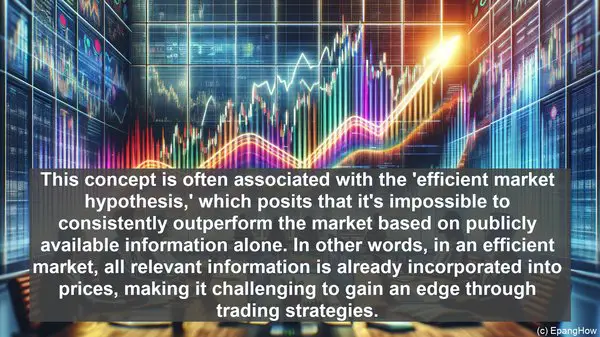Introduction: The Dual Dimensions of Market Performance
Hello everyone, and welcome to today’s discussion on market efficiency and market effectiveness. While these terms might sound similar, they represent distinct aspects of market performance. In this article, we’ll explore their definitions, delve into their differences, and examine their significance in the world of economics. So, let’s get started!

Defining Market Efficiency: The Holy Grail of Trading
Market efficiency refers to the degree to which prices of assets or goods reflect all available information. In an efficient market, prices adjust rapidly and accurately to new information, leaving little room for mispricing or arbitrage opportunities. This concept is often associated with the ‘efficient market hypothesis,’ which posits that it’s impossible to consistently outperform the market based on publicly available information alone. In other words, in an efficient market, all relevant information is already incorporated into prices, making it challenging to gain an edge through trading strategies.
Unpacking Market Effectiveness: The Real-World Impact
While market efficiency focuses on price accuracy, market effectiveness zooms out to consider the broader outcomes and goals of a market. Effectiveness is concerned with how well a market achieves its intended purpose, whether it’s allocating resources efficiently, promoting competition, or ensuring fair access. For instance, a market might be efficient in terms of price accuracy but could still be deemed ineffective if it fails to distribute goods or services to those who need them most. In this sense, effectiveness encompasses not just the mechanics of a market but also its societal and economic implications.
Metrics and Measures: Quantifying Efficiency and Effectiveness
To gauge market efficiency, economists often rely on metrics like ‘price-to-earnings ratios’ or ‘bid-ask spreads.’ These indicators provide insights into how quickly and accurately prices adjust to new information. On the other hand, assessing market effectiveness can involve a broader set of measures. For example, in the case of a healthcare market, effectiveness might be evaluated based on metrics like ‘patient outcomes’ or ‘accessibility to care.’ These measures go beyond price dynamics to capture the market’s impact on various stakeholders.
The Interplay: Efficiency and Effectiveness in Practice
In reality, market efficiency and market effectiveness are not mutually exclusive. While they represent different dimensions, they often interact and influence each other. For instance, regulatory interventions aimed at enhancing market effectiveness, such as imposing safety standards or consumer protection laws, can also impact market efficiency. Similarly, actions that improve efficiency, like reducing transaction costs or enhancing information dissemination, can contribute to market effectiveness. Recognizing this interplay is crucial for policymakers and market participants alike, as decisions made to enhance one dimension can have implications for the other.

